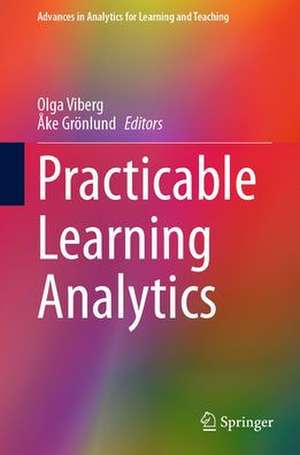Practicable Learning Analytics: Advances in Analytics for Learning and Teaching
Editat de Olga Viberg, Åke Grönlunden Limba Engleză Hardback – 31 mar 2023
The contributions of this book go beyond a consideration of particular humans such as teachers and students, and their individual activities to consider the larger systems of activity of which analytics become part of. The chapters included in this book present different cases of learning analytics implementation across countries, and the related opportunities and challenges related to generalizability of the results.
The book is written for designers, students and educators of learning analytics who aim to improve learning and teaching through learning analytics.
Preț: 1001.50 lei
Preț vechi: 1221.34 lei
-18% Nou
Puncte Express: 1502
Preț estimativ în valută:
191.63€ • 200.62$ • 158.57£
191.63€ • 200.62$ • 158.57£
Carte tipărită la comandă
Livrare economică 07-21 aprilie
Preluare comenzi: 021 569.72.76
Specificații
ISBN-13: 9783031276453
ISBN-10: 3031276450
Pagini: 206
Ilustrații: XIV, 206 p. 50 illus., 46 illus. in color.
Dimensiuni: 155 x 235 mm
Greutate: 0.49 kg
Ediția:2023
Editura: Springer International Publishing
Colecția Springer
Seria Advances in Analytics for Learning and Teaching
Locul publicării:Cham, Switzerland
ISBN-10: 3031276450
Pagini: 206
Ilustrații: XIV, 206 p. 50 illus., 46 illus. in color.
Dimensiuni: 155 x 235 mm
Greutate: 0.49 kg
Ediția:2023
Editura: Springer International Publishing
Colecția Springer
Seria Advances in Analytics for Learning and Teaching
Locul publicării:Cham, Switzerland
Cuprins
Chapter. 1. Introducing Practicable Learning Analytics.- Chapter. 2. Embedding Learning Analytics in a University: Boardroom, Staff Room, Server Room, Classroom.- Chapter. 3. Applying and translating learning design and analytics approaches across borders.- Chapter. 4. Learning Dashboards for Academic Advising in Practice.- Chapter. 5. Students in Focus - Moving Towards Human-Centred Learning Analytics.- Chapter. 6. LALA Canvas: A model for guiding group discussions in early stages of learning analytics adoption.- Chapter. 7. How learning process data can inform regulation in collaborative learning practice.- Chapter. 8. Learning Analytics Education: A case study, review of current programs, and recommendations for instructors.- Chapter. 9. Learnersourcing Analytics.- Chapter. 10. Designing Culturally Aware Learning Analytics: A Value Sensitive Perspective.- Chapter. 11. Challenges and Recommendations on the EthicalUsage of Learning Analytics in Higher Education.
Notă biografică
Olga Viberg is associate professor in Media Technology, with specialization in Technology-Enhanced Learning at the Department of Human-Centered Technology at KTH Royal Institute of Technology in Sweden. She is also an active faculty member of Digital Futures at KTH. Viberg's research includes a focus on learning analytics in higher education, self-regulated learning, cross-cultural research and responsible use of student data in education, focusing on the issues of privacy and trust. Viberg is an active member of the Digital Futures group on Educational Transformation at KTH and several other international networks (e.g., the Society of Learning Analytics.) She has served as the keynote speaker at several prestigious international conferences. Viberg has also contributed to the UNESCO policy work on quality of online education. Viberg is the main organizer of the Nordic Learning Analytics Summer Institute (2021 & 2022) and a part of the organizing committee of the 12th International Learning Analytics and Knowledge Conference, and the PC chair for ECTEL2023 and Learning at Scale2023. She serves as the Editor-in-Chief of the International Journal of Learning Analytics.
Åke Grönlund is professor of Informatics at Örebro. His research concerns the use of digital technologies and information in various human activities. The common denominator involved in all projects is to understand how people arrange their work, their organizations, and other activities pertaining to private life, such as socializing on the web, and how technology can be used to make improvements. Over the years, particular focus has been on the fields of education and e-government.
Textul de pe ultima copertă
This book is about practicable learning analytics, that is able to become a successful part of practice, ultimately leading to improved learning and teaching. The aim of the book is to shift our perspective on learning analytics creation and implementation from that of “designing of” technology to that of “designing for” a system of practice. That is, any successful implementation of learning analytics requires a systematic approach, which the book explains through the lens of the Information Systems Artefact, constituting of the three interdependent artefacts: “technical”, “information” and “social”.
The contributions of this book go beyond a consideration of particular humans such as teachers and students, and their individual activities to consider the larger systems of activity of which analytics become part of. The chapters included in this book present different cases of learning analytics implementation across countries,and the related opportunities and challenges related to generalizability of the results.
The book is written for designers, students and educators of learning analytics who aim to improve learning and teaching through learning analytics.
Caracteristici
The book offers a unique angle to practicable learning analytics It goes beyond the focus on human-centered learning analytics only Offers a more inclusive perspective of information systems artefact to achieve the goals of learning analytics










